#Mad in Czechoslovakia
Text
i won't lie, movies look really appealing when they'll check off a bunch of countries on my movie map on letterboxd

2 notes
·
View notes
Text

Howling II: Your Sister Is a Werewolf will be released on 4K Ultra HD + Blu-ray on October 29 via Vinegar Syndrome. Chris Barnes designed the cover art for the 1985 werewolf sequel; the original poster is on the reverse side.
Philippe Mora (Communion) directs from a script by The Howling novel series author Gary Brandner and Robert Sarno. Christopher Lee, Annie McEnroe, Reb Brown, Marsha Hunt, and Sybil Danning star.
The film has been newly restored in 4K from the 35mm original camera negative with Dolby Vision HDR. Special features are listed below.
Special features:
Commentary track with director Philippe Mora and author/screenwriter Kelly Goodner (new)
Commentary track with director Philippe Mora
Commentary track with composer Steve Parsons and editor Charles Bornstein
Lights, Camera, Werewolves? - a conversation with director Philippe Mora and filmmaker Michael Mohan (35 min)
A Romp Through Czechoslovakia - an interview with actress Annie Pressman (15 min)
Thrown to the Wolves - an interview with special make-up effects artist Steve Johnson (11 min)
A Life Collaboration with Philippe Mora - an interview with Pamela Krause, Philippe Mora's wife and artist consultant (11 min)
Freaky, Sexy, Mad - an interview with composer Stephen Parsons (16 min)
Lord of the Stricken Field - film historian Jonathan Rigby on Christopher Lee and Howling II (25 min)
Queen of the Werewolves - an archival interview with actress Sybil Danning (17 min)
Leading Man - an archival interview with actor Reb Brown (14 min)
A Monkey Phase - an archival featurette with special make-up effects artists Steve Johnson and Scott Wheeler (15 min)
Theatrical trailer
Still gallery
Ben is mourning the recent death of his sister, Karen, whom he believes to have been killed in a savage wolf attack. At her funeral, Ben is approached by the mysterious Stefan, who warns him that a cult of werewolves had attacked Karen and that she too will become an undead lycanthrope. Although dismissing his claim as mere superstition, Ben’s girlfriend Jenny convinces him that he should take Stefan’s warning more seriously, and, sure enough, Karen is soon back from the dead, covered in fur and complete with a deadly set of K9s. After being narrowly saved from a fatal bite by Stefan, Ben is persuaded that he’s telling the truth and volunteers to join him on his mission to destroy the increasing hoards of beastly creatures ravaging Europe. But as their journey takes them to Transylvania, where werewolves from around the world are gathering for their ritual, Ben and Stefan fear that they might be in over their heads, mainly once werewolf queen Stirba receives news of their arrival…
Pre-order Howling II: Your Sister Is a Werewolf.
#howling ii#the howling#christopher lee#sybil danning#vinegar syndrome#dvd#gift#horror#80s horror#1980s horror#philippe mora#annie mcenroe#reb brown#marsha hunt#Howling II: Your Sister Is a Werewolf
20 notes
·
View notes
Text
Dread by the Decade: Best of the 1930s
👻 You can support or commission me on Ko-Fi! ❤️
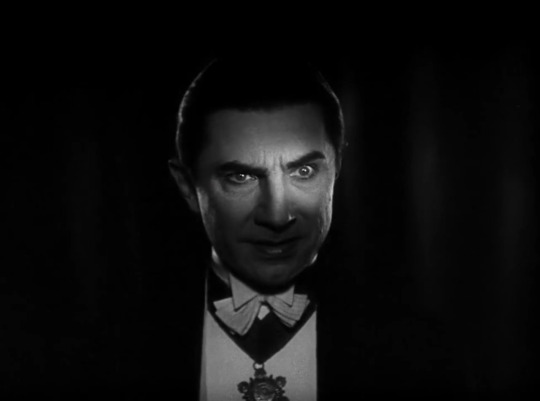
Dracula (1931 | USA): a doctor and young man must defeat a powerful vampire. ★★★★½
Review | Screenshots | Facts
See below the cut for the rest of the list!
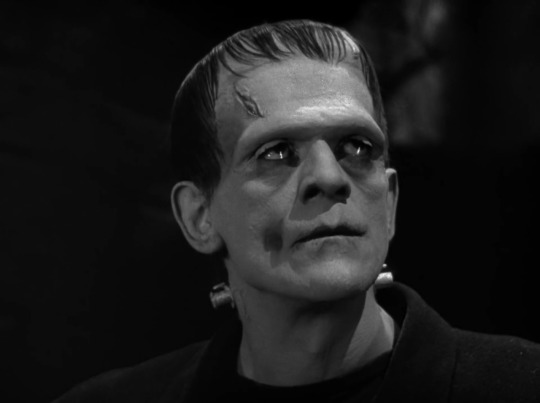
Frankenstein (1931 | USA): a scientist unnaturally creates life. ★★★★★
Review | Screenshots | Facts
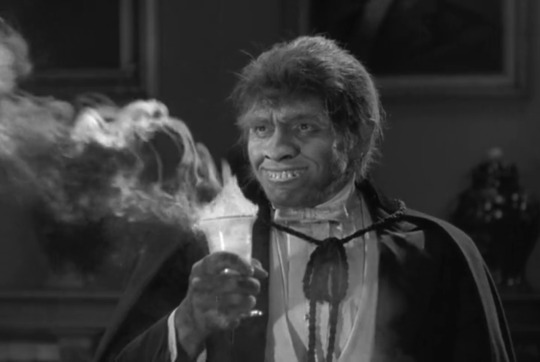
Dr. Jekyll and Mr. Hyde (1931 | USA): a doctor makes a potion that turns him into a violent sadist. ★★★★
Review | Screenshots | Facts

M (1931 | Germany): the people of Berlin search for a child murderer. ★★★★½
Review | Screenshots | Facts

Freaks (1932 | USA): sideshow performers must save their friend from a cruel trapeze artist. ★★★★
Review | Screenshots | Facts
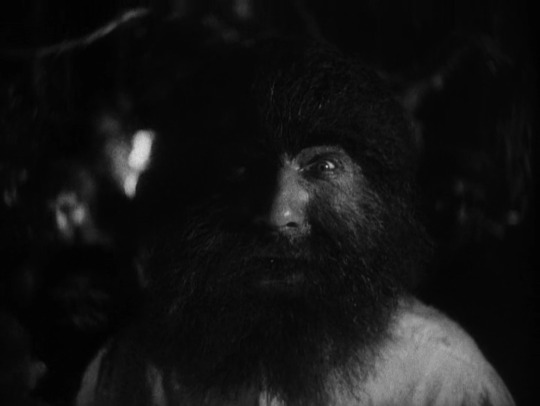
Island of Lost Souls (1932 | USA): a man is stranded on a mad scientist's island. ★★★★
Review | Screenshots | Facts

The Old Dark House (1932 | USA): people shelter in a strange home. ★★★½
Review | Screenshots | Facts
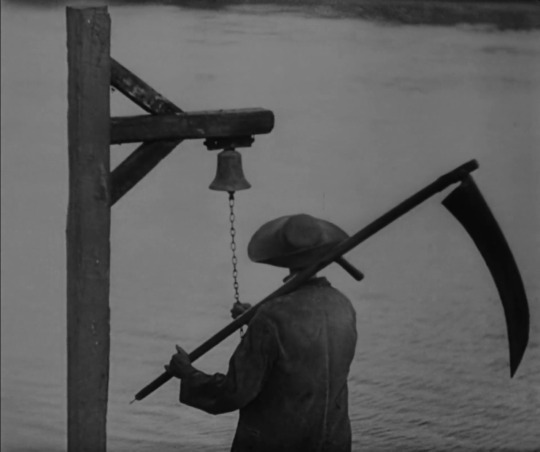
Vampyr – Der Traum des Allan Gray (1932 | Germany): a man must save women from a vampire's curse. ★★★
Review | Screenshots | Facts
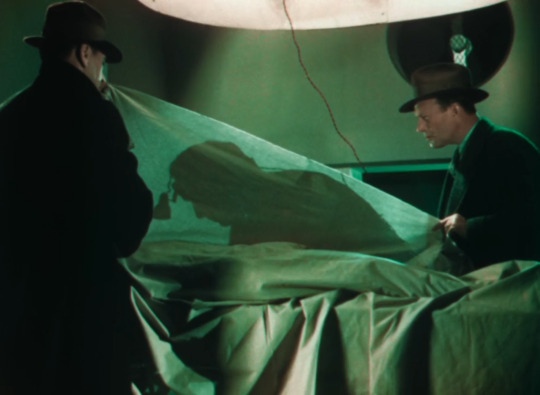
Doctor X (1932 | USA): a doctor tries to catch a serial killer. ★★★
Review | Screenshots | Facts

La Llorona (1933 | Mexico): a man fears ghosts have cursed his family. ★★★½
Review | Screenshots | Facts
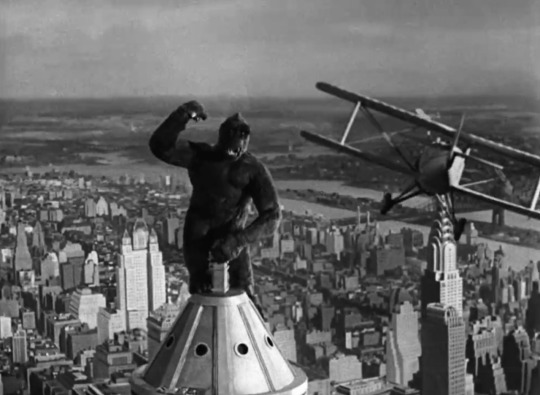
King Kong (1933 | USA): an actress is abducted by a giant ape. ★★★
Review | Screenshots | Facts

The Invisible Man (1933 | USA): a scientist is driven mad by an experiment that turns him invisible. ★★★★
Review | Screenshots | Facts

The Black Cat (1934 | USA): a WWI POW seeks the man who betrayed him. ★★★½
Review | Screenshots | Facts

El fantasma del convento (1934 | Mexico): three people shelter in a strange monastery. ★★★½
Review | Screenshots | Facts
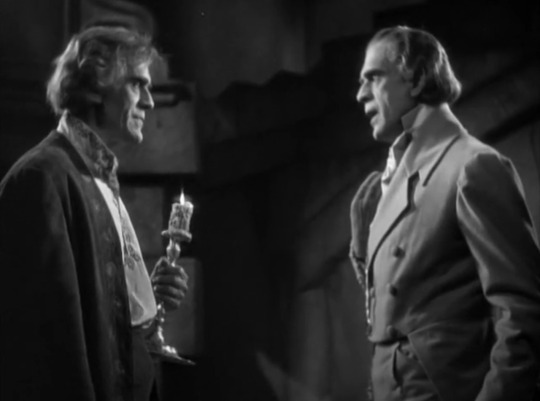
The Black Room (1935 | USA): a prophecy foretells that a baron's twin will kill him. ★★★★
Review | Screenshots

The Bride of Frankenstein (1935 | USA): Frankenstein is forced to build his monster a bride. ★★★★½
Review | Screenshots | Facts

Mad Love (1935 | USA): a mad doctor replaces a pianist’s hands with a murderer’s. ★★★½
Review | Screenshots | Facts

The Raven (1935 | USA): a doctor becomes obsessed with a young dancer. ★★★
Review | Screenshots | Facts

Werewolf of London (1935 | USA): a botanist is cursed. ★★★★
Review | Screenshots | Facts

The Devil-Doll (1936 | USA): a man uses a shrinking potion to seek revenge. ★★★½
Review | Screenshots | Facts

Fährmann Maria (1936 | Germany): a ferryman ushers Death across the river. ★★★
Review | Screenshots | Facts
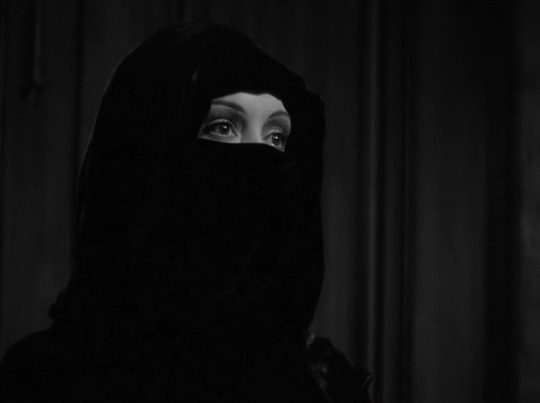
Dracula's Daughter (1936 | USA): Dracula's daughter tries to undo her curse. ★★★
Review | Screenshots | Facts
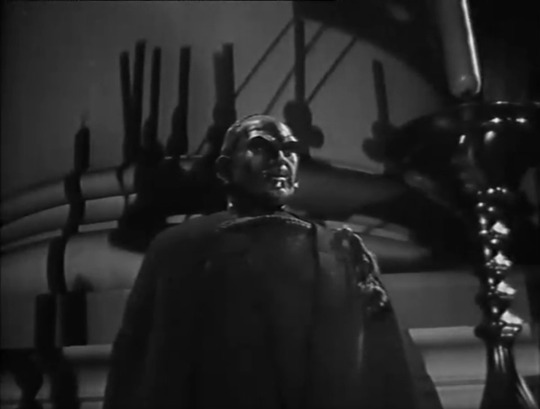
Le Golem (1936 | Czechoslovakia): a rabbi reawakens a golem to save his people. ★★★★
Review | Screenshots | Facts

夜半歌声 (1937 | Republic of China): an actor believes he is being tutored by a ghost. ★★★★
Review | Screenshots | Facts
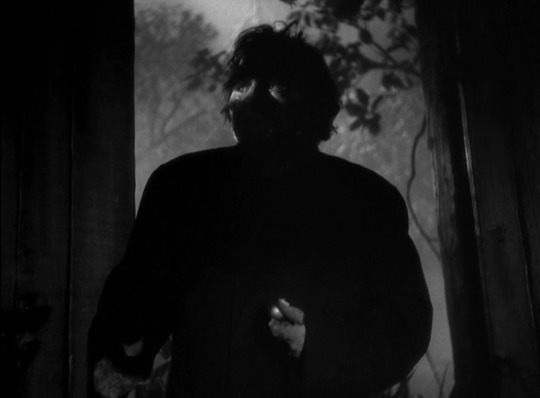
The Cat and the Canary (1939; USA): a millionaire's heirs are stalked by a killer. ★★★★
Review | Screenshots | Facts
20 notes
·
View notes
Text
anyways why have there been at least 3 occasions in my life where ive had to tell someone czechoslovakia was dissolved in the 90s. some kid in 4th grade, my aunt (got really mad and argued with me over it?), and some guy at work just now. its like im the only one that cares
12 notes
·
View notes
Note
1 3 17 24 for the historical questions ask !
Thank you for the ask anon!
1. Who is your favourite historical person?
Already answered here! But, as a speed run, Camille Desmoulins and Émilie du Châtelet at the moment. Plus honorary mention for Brutus, Fulvia and Catullus.
3. What is your country most infamous for in history?
Oh, that's interesting. We don't really have a colonial history per se, at least not directly.
So that leaves us with the expulsion of Germans from Czechoslovakia after WW2. Yes, I could understand why it was a problem for the German minority to remain here, yes, I could understand that people were mad at the Germans after being subjected to the atrocities of the Nazi regime for seven years, but it was still needlessly brutal.
17. What historical item would you like to own?
I've always liked signet rings! They are nice to look at, and something about using a ring to validate documents just seems really cool.
On a more serious note, probably a first edition of some book or a letter from the 18th century, though it's very hard for me to choose a specific one.
24. Most underrated historical figure?
She's fortunately far from being underrated here on Tumblr, but I'd probably go with Fulvia. The sheer power she exuded, how she organised Antony's legions while he was away, the fact that she was basically a fourth member of the second triumvirate at some point... But the way history is taught in the more mainstream circles would have you believed that no woman had any sort of influence on Roman politics except for maybe Cleopatra.
Also Chevalier d'Éon! I mean 18th century trans spy? How are people not constantly talking about her?
#thanks for the asks!#ask game#ask away#history#czech history#d'Éon#18th century#frev#fulvia#ancient rome
7 notes
·
View notes
Text
Breaking down the comics: Going Home.
Moon Knight, Issue #14: Stained Glass Scarlet
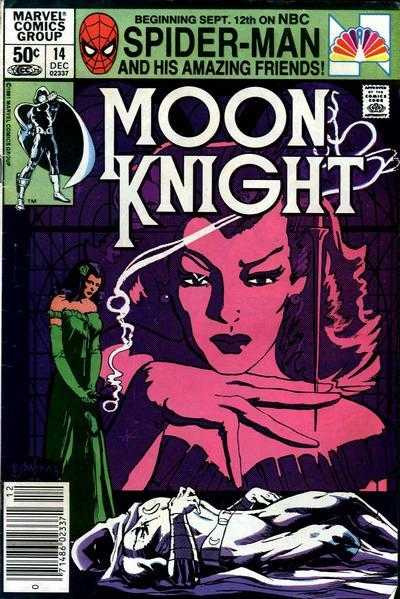
OH BOY OH BOY.
Just…Take a minute to appreciate this art:
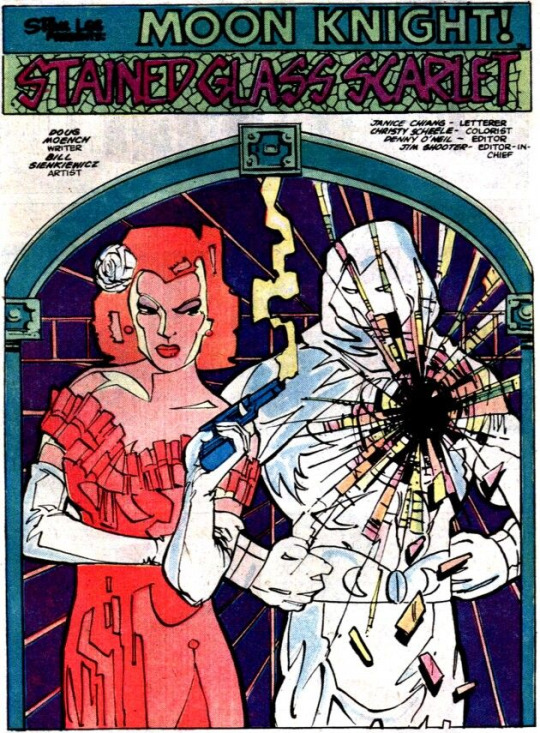
Damn that’s beautiful!
Okay everyone!
Here's a bit of rogue history for you! Especially since Scarlet showed up in a recent run!
Her story is a sad one.
The story starts in an abandoned church. A story of forgotten worship, run down and empty pews, infested sanctuary, and empty promises of atonement.
"But high above the corruption, just under the church's vaulted roof in what was once the attic, there is a place of melancholy comfort... If not sanctuary.
It is here that Scarlet-- Stained Glass Scarlet-- has lived for the past three years, quiet as languid smoke, unknown by the crumbling world outside."
Damn fine narration as always, Moench.
And damn fine art.
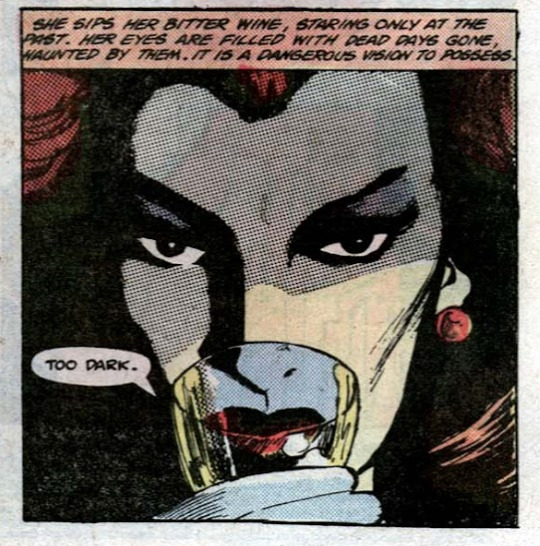
She carries out a lonely routine. Playing on the silent ruined Organ, gazing at the vast empty space and far away stars, playing pre-recorded chess games, and at last looking through her old photo album.
"And each piece of the past is like a shard of stained glass... But all of them, even glimpsed together never adding up to a window with a clear view."
She looks at pictures of her first communion. Her wedding. Her baby.
The album ends in a newspaper clipping "Joe 'Mad Dog' Fasinera escapes prison. Guard killed in break."
Cut to a vastly different location. "A fortress of wealth and security...Sanctuary."
We are at Grant Mansion.
Here we see Steven and Marlene sharing a moment.
Marelene remarks that they really are lucky.
"[...] Referring to you, to the change you've accomplished. Going from a conscienceless mercenary to a man like Moon Knight is no light-"
"Yes... well, if it's the miraculous redemption of my spirit we're talking about-"
They sit together and look at a collected work of "Alphonse Mucha."
You have to understand something about comics. When they show you a book with a title or author, it has a purpose.
You are supposed to recognize the name or title and understand that it will have an impact on the story later.
So...
Alphonse Mucha. Who is that?
He's a Czech painter/illustrator/graphic artist from the art Nouveau period.
He did this:

Yeah. THAT. You've seen his work. You'll also notice that the second cover image has a similar style.
He also did this stained glass art piece in the :
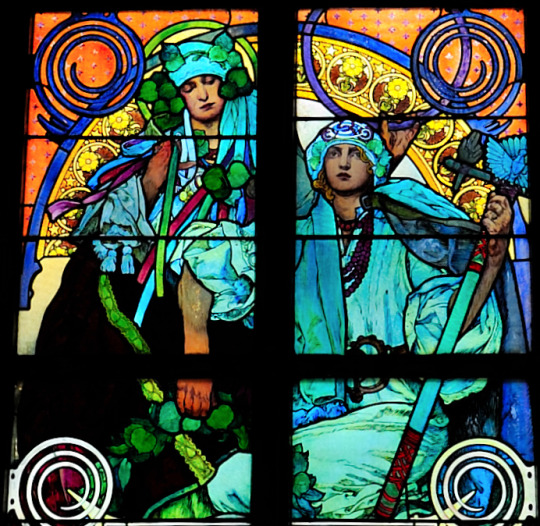
He loved his country of Czechoslovakia and did many works celebrating the slavic people and the independence of his country... in 1920s-1930.
Yeah... You see where this is going if you know your history.
When Hitler invaded and took over Czechoslovakia, Mucha was captured as a nationalist and severely interrogated for many days. When he was released, he was in poor health. He contracted pneumonia and died a month before the outbreak of WWII.
Check out his art, it's beautiful.
You should also keep in mind that The Spectors are also from Czechoslovakia.
"The clerk in Rizzoli's said he's seen the originals of these--ten feet tall, almost like stained glass windows--hanging in belgium."
So Steven bought this book.
Why? Sure, he's about being rich and living the high light. In earlier issues (particularly the one with Mogart) he had shown an interest in art.
But why this one?
Marlene goes to the piano and starts to play "In My Life" by the Beatles.
Wait, when did this comic come out?
December 1981.
Ahhhh. The one year anniversary of the death of John Lennon.
Sometimes comics cover world events and note how they affect others.
We see them cry and hug.
"The dream is over. John Lennon is dead. [....] Guns. And guilt."
We cut to Scarlet, listening to the news on the radio.
It talks about gunfire in the Bronx attributed to the 'Mad Dog' Fasinera, the escaped convict.
The radio goes on about Mad Dog going on a murder spree.
Scarlet sheds some tears.
Back at the mansion, Steven also hears about the shootings. He runs to get ready as Moon Knight.
We cut to Mad Dog in a shoot out. He talks about revenge for his father and getting his father's money. He's going ot 'cut the old neighborhood to ribbons'.
We see Moon Knight on the roof getting into the chopper.
"Don't worry about it, Lady- Grant'll be back."
"Who will be back, Steven?"
"Okay, Already. I'LL be back."
Again, we see the push by Marlene to have them all be Steven and the push back and frustration.
Marlene still at this point thinks they are pretending to be someone else and she wants them all to just be Steven.
Scarlet also cloaks up in her signature red outfit and heads out into the night.
Moon Knight fights the Mad Dog and his gang shooting up a store. He busts in and breaks it up, taking down a few while the others get away.
He follows them to an abandoned grocery store and sees Scarlet standing outside.
She goes inside and finds the rest of Mad Dog's gang, but no Mad Dog. She demands to know where Joe 'Mad Dog' is.
She tells them that when they see Joe to tell him 'What he's looking for is in the church." She then leaves.
Moon Knight follows her back to the church and confronts her.
She tells him her story.
Joe is her son!
"I was young, Moon Knight, in love with the idea of being in love..."
She talks about how Joe was the result and consequence of her love. Now, she means to 'salvage' the consequences and save Joe.
When she was much younger, she wanted to be an actress or a nun. She chose the role of being a nun.
Once she was a nun, she realized that she was only acting and regretted her choice.
She realized this when she met a man named "Vince". Vine had just stolen a lot of money and run to the church out of guilt.
She helped him and 6 months later she married him and left the church.
"Instead, I devoted myself to my husband, hoping I could help him change, hoping I could use my own failure to redeem him... The baby came and I named him Joseph... But Vince never came to the hospital once. I had to take a cab home."
After 15 years, she realized that this too was just a 'role'. Vince robbed a bank and killed the guard. He stashed the money and got in a shoot out with the police, who killed him in front of the church.
When Joe heard his father was killed, he 'declared war on law and order."
By 19 he had killed someone and left home. He went to jail for life.
When her son went to jail, she moved to the church. "Jut to play another role, the fallen woman turned mad hemit."
Moon Knight asks her why the church.
"Just before the police caught up to him, Vince told a friend that he was going to hide the bank money in a special place where he 'pulled an angel straight down from heaven'."
She moved to the church knowing that her son would eventually come looking for the money.
Joe makes a draatic entrance and demands to know where the money is.
She begs him to stop. To give up and turn himself in.
Moon Knight gets shot in a scuffel and Scarlet shoots Joe.
Joe staggers and accidentally grabs the church bell rope. As he falls, all the hidden money falls down with him.
Scarlet stands over her dead son.
"Thomas Wolfe's Maudlin line is true, Moon Knight... You never can go home again. Once you've turned your back on it... It's gone. Forever."
(A very hard and true statement. I wonder if it hit home for Marc too. A man that ran from home and turned his back on everything. Had he ever tried to go home? Or was he still running?)
Scarlet disappears into the night. Moon Knight stands over the discarded gun. “Guns…” Lamenting on how easily they take and destroy. Much like the death of John Lennon. An idea that is killed.
Moon Knight returns back to the mansion, wounded but alive.
"Some succeed in their chosen mission. Others fail, no matter how hard they try."
That is the end of the issue, but not the last time we will see Stained Glass Scarlet.
I’ll cover each of her appearances, but this is a Moon Knight Villain that I always did enjoy.
So what about the artist? Alphonse Mucha is best known for his Art Nouveau period, but it wasn’t what he wanted to be known for.
For him, he loved his home. He loved his little country that had fought and struggled to become whole. One of his final pieces was about his own people. “History of the Slav”. It depicted his people’s struggles to survive and build their country.
It was put in a museum for a bit then rolled up and put into storage.
Now and then it is pulled out and shown in Prague, but not for long or often. His country was then invaded and torn apart over and over again. He died as it was on the brink.
Again, we have to remember that the Spectors are from Czech. While Mucha was devoutly Catholic and did a lot of work that went to the churches, he wasn’t openly recognized for a lot of it. He was most famous for the work he did in Paris.
Scarlet tried to find herself and found herself in role after role, pretending to be happy and not finding herself. Her legacy becomes her failure to save her husband and then her son, born from her misguided attempt to find her purpose. She then kills that legacy.
It’s odd in this comic how Moon Knight really doesn’t have much of a role in it. We focus on Mucha, John Lennon, and Scarlet.
The bits we do see of Moon Knight are him looking into an artist from Czech who left a legacy he didn’t want. Him lamenting over the senseless killing of a man that meant so much to a lot of people. And him hearing the story of a woman trapped in finding her meaning and her past.
It’s one of those issues that leaves you feeling like you are taking a peak behind a curtain but can’t quite see the full picture. It also leaves you wondering.
And later, much later, in recent issues, when we see the remains of Scarlet, there is a sadness there. A bit of the past that Moon Knight could never let go of. And we’ll see more of that later when she shows up again.
#Moon Knight#Moon Knight Comics#Moon Knight meta#Analyzing the comics#Marc Spector#Steven Grant#Jake Lockley#Stained Glass Scarlet#Moon Knight's rouge gallery#For everyone that had no idea what that new Stained Glass Scarlet episode really was about#I want more than anything to dive into the idea of Steven wanting to know his past#I want Steven to research his own people#I want Marc to talk about going home#I want Jake to touch on the fact that he has built his own people because he has none#I'm not normal about Moon Knight#I love Stained Glass Scarlet#She always makes Moon Knight pause and reflect#He lets her get away
24 notes
·
View notes
Note
Croatia kisser Czechia for for money
And then Czechia asked to kiss them again
And Czechoslovakia is very mad at this
@definitely-totally-croatia
You know you enjoyed it just do it again
6 notes
·
View notes
Text
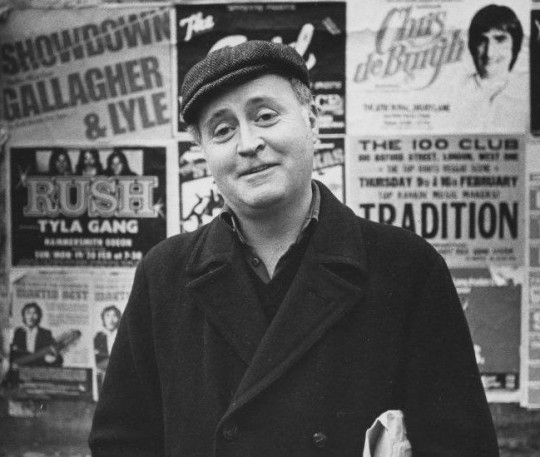
The battle to remove censorship from the British stage was fought primarily at the Royal Court theatre in London during the mid-1960s. The plays of Edward Bond, one of the most important British dramatists of the 20th century, who has died aged 89, were an essential part of that story and that struggle.
Bond had submitted plays to George Devine’s recently established English Stage Company at the Royal Court in 1958 and, as a result, was invited to join the theatre’s Writers’ Group. His first performed play, The Pope’s Wedding, was given in a production without decor on 9 December 1962, and Devine then commissioned a new play, which Bond submitted in September 1964.
That play, Saved, was presented privately for members of the English Stage Society in November 1965 after the lord chamberlain – the official censor to whose offices all new theatre plays had to be submitted – demanded cuts in the text. The play was the most controversial of its day, not just because of the explicitness of the sexual swaggering and dialogue, but because of a scene in which a baby is stoned to death in its pram.
The stays of middle-class propriety in the contemporary theatre had already been given a good vicious tug in the work of David Rudkin and Joe Orton, but this was something else. There was uproar in the theatre, and in the reviews, and a visit by the police. The theatre was hauled into court after an alleged minor breach of the club licensing laws, and many notable witnesses, including Laurence Olivier, spoke in the play’s favour. Penelope Gilliatt wrote in the Observer that the play was about brutishness, not brutish in itself: “The thing that makes Saved most painful to watch is the fact that the characters who won’t listen to other people’s desperate voices are in despair for lack of a listener themselves.”
Bond’s next play, Early Morning, was banned outright. It was a surreal fantasy, featuring Queen Victoria and Florence Nightingale as lesbian lovers, two conjoined twin princes, and cannibalism in heaven. Again, the vice squad paid a call, performances were cancelled and a private dress rehearsal arranged for the critics in April 1968.
By now the theatres bill was on its way in the House of Commons, becoming law in September. Plays were finally removed from the control of the lord chamberlain, who had held censorious sway over the nation’s entertainment since 1737. Violence, sex, political satire and nudity were bona fide subjects at last for the modern theatre.
William Gaskill, the artistic director of the Court in succession to Devine, mounted a Bond season in 1969 that established his reputation both in Britain and abroad, during a tour to Belgrade and eastern Europe. Saved was given 14 productions in West Germany and opened to acclaim in the Netherlands, Denmark, Japan, Czechoslovakia and the US.
This period was one of defiance at the Royal Court, and the experience marked everyone who worked there for life, none more so than Bond and Gaskill. Bond was acknowledged as the inheritor of Brecht’s legacy in the flintiness of his writing and the uncompromising artistic vision of his scenes and stage pictures.
He wrote many fine plays in the subsequent decade: his Lear (1971) was a majestic, pitiless rewriting of Shakespeare, with Harry Andrews unforgettably scaling a huge, stage-filling wall at the end; Bingo (1973) and The Fool (1975) drew chilling portraits of English writers – Shakespeare (played by John Gielgud at the Court – and by Patrick Stewart in a 2010 revival at Chichester) and the rural poet John Clare (Tom Courtenay) – at odds with their societies, driven respectively to suicide and madness; and The Woman (1978), the first new play to be produced on the National’s new Olivier stage, was an astounding, panoramic survey of Greek myths and misogyny.
Bond was born in Holloway, north London, one of four children. His parents were farm labourers in East Anglia and had come to London looking for work. Bond was evacuated during the second world war, first to Cornwall and later to live with his grandparents near Ely, Cambridgeshire. He attended Crouch End secondary modern school in London in 1946 and left when he was 15. “That was the making of me, of course,” he said, “you see, after that nobody takes you seriously. The conditioning process stops. Once you let them send you to grammar school and university, you’re ruined.”
He enjoyed the music hall and was impressed by Donald Wolfit as Macbeth at the Bedford theatre in Camden Town in 1948: “I knew all these people, they were there in the newspapers – this was my world.”
After school he worked as a paint-mixer, insurance clerk and checker in an aircraft factory before beginning his national service in 1953. He was stationed in Vienna and started to write short stories.
Once Saved had been performed and he knew he would always work in the theatre, he bought a house on the edge of a small village, Wilbraham, near Cambridge, and lived there contentedly with his wife, the German-speaking Elisabeth Pablé, a writer, whom he married in 1971 and with whom he collaborated on a new version of Wedekind’s Lulu based on some newly discovered jottings and manuscripts in the early 90s.
His early plays were often based in situations and societies he was familiar with, whatever their period setting, but Bond’s later work took on a more resonant, prophetic, some felt pompous, tone. Put simply, according to Richard Eyre and Nicholas Wright in Changing Stages, their 2000 account of the British theatre, Bond used to ask questions; now he gave answers.
He acquired a reputation as a rather remote guru, and his later, proscriptive epics about the failure of capitalism and the violence of the state were more often performed by amateurs than by the leading companies in Britain.
The Worlds (1979), for instance, was first given by amateurs in Newcastle, but its scope was immense, charting the collapse of a successful business operation riddled with strike action, terrorism, kidnappings and long speeches. In one of these, a terrorist defines the two worlds as one of appearance and one of reality. In the first, she says, there is right and wrong, the law and good manners. In the second, which controls the first, machines and power.
Before going into what he called voluntary exile from the British theatre establishment, Bond wrote the “pastoral” Restoration (1981) for the Court, an often witty inversion of a Restoration comedy, with Simon Callow in full flow as Lord Are, and Summer (1982) for the National, a comic, modern rendering of The Tempest set in the sunny Mediterranean.
Bond was a dapper, withdrawn man who could be intimidating, but disarmingly gnomic and self-deprecating when he was in the mood. Sympathetic interviewers could be treated to bilious attacks on directors such as Sam Mendes – whose 1991 revival of his 1973 comedy The Sea, a beautiful play of madness and dehumanisation in an Edwardian seaside town, he loathed – and Trevor Nunn (who, he said, turned the National Theatre into “a technicolour sewer”), though he never raised his voice and often dissolved into mischievous chuckling.
Even the collapse of eastern European socialism could not stem the flow of Bond’s writing. “Before, as a socialist writer,” he once told me, “you knew there was a framework, a system to which the play might eventually refer. But now, the problem of the last act has returned! And I was always a critic of the system to start with. That’s why I wrote my version of King Lear.”
More recently, you had to hunt pretty hard to find his new work. There was an intriguing season of six plays at the Cock Tavern in the Kilburn High Road, north London, in 2008, and several more performed by Big Brum, a theatre-in-education company in the Midlands, between 2012 and 2014.
Jonathan Kent directed a revival of The Sea at the Haymarket, starring David Haig and Eileen Atkins in 2008, while Sean Holmes provided the first London production of Saved in 27 years – still harrowing, more pertinent than ever – at the Lyric, Hammersmith, in 2011.
Following the example of Brecht, Bond was prolific in supplying his work with the extra apparatus of poems, prefaces and notebooks, though, unlike Brecht, a giant of an intellectual all-rounder in comparison, and a far superior poet, he was always better when restricting himself to stage dialogue.
He also wrote for films, including the screenplay for Nicholas Roeg’s Walkabout (1971), set in the Australian outback and starring Jenny Agutter and David Gulpilil, and the Nabokov adaptation Laughter in the Dark (1969), as well as contributing dialogue for Michelangelo Antonioni’s Blow-Up (1966) and Nicholas and Alexandra (1971).
At his best, he was a genuine poet of the stage, and exerted an enormous influence on at least two generations of theatre workers after him. It is possible that some of the unknown plays of his later, post-nuclear apocalyptic period will be ripe for assessment. The place of at least 10 of his earlier plays is secure in the national literature and they are certain to be revived. He remains much admired and often performed in France and Germany.
Elisabeth died in 2017.
🔔 Thomas Edward Bond, playwright and director, born 18 July 1934; died 3 March 2024
Daily inspiration. Discover more photos at Just for Books…?
4 notes
·
View notes
Text
Let me share my "Sauron and I" story.
In 1990, when I was 14, a classmate lent me the Czech translation of the Hobbit, claiming I might like it. I did. But, and I think that is remarkable, my thoughts at the end were "I'd like to know more about the Necromancer" (translated as the Sorcerer).
There was a text on Tolkien at the end of the book and I learned that there is a whole TRILOGY of books where that particular unsavoury character is crucial to the plot. How is it possible I knew nothing about Tolkien at the ripe age of 14? In the Communist Czechoslovakia, "escapist" literature was, as a general rule, not published. That only changed when the regime fell in 1989. The first translation of LotR was published in 1990, but by the time I had read The Hobbit it was sold out. My library didn't have it. So I found someone who had it and borrowed it.
I was looking forward to "meeting" Sauron, until... we never did. My disappointment was huge. I loved the book, you see, but after the Dark Lord was defeated the rest bored me (in my defense, I *was* 14 and also, my expectations were subverted :-)). I read the Silmarillion, too, so I learned something more. And I was actually wishing for Mairon to repent. In the AU in my head. I had no idea it was called fanfiction. I learned that in 2000s with the arrival of the internet. And before that I never knew anybody who was inventing stories related to books/movies in their head.
As for Sauron... when PJ's movies arrived, I got at least the Eye.
When The Hobbit trilogy came out, we got DOL GULDUR. And the tombs of the Nine (love me some dark aesthetics). And that lovely abstract fight between Gandalf and Sauron. I didn't enjoy Galadriel vs Sauron that much, that came... later. Much later. Ahem.
And then I learned Amazon was planning a 2nd Age show. I would get Annatar! When I started watching the show, I was so looking forward to FINALLY meeting him.
Except, by Episode 3 I was in love with Halbrand. And I didn't want him to be Sauron, despite the mounting evidence, because that would mean he'd end up... we know how... and I actually liked him and wanted something better for him. Even though it was clear his future would be dark. But a girl can hope, surely? *mad cackle*
Denial, denial, denial.
And then I watched Episode 8. I shed my tears, my heart was broken, I started to write fanfic to process my grief (genre: redeeming Mairon, unsurprisingly)...
So, we are in 2023, I am 46, and ended up... rooting for Sauron. Because, what other choice do I have?
And, given my history, what else did I expect? 🤣
---
A bonus screencap. Yes, you smug bastard, I love you.

#the rings of power#halbrand#sauron rop#me and mairon throughout the years#well#decades#more like#based on a true story#i also need to add the tag#myropstills#because i need all of mine under one tag#no#i have nothing in common with sauron#except everything needs to be sorted#my place is still a mess but that's because i have too many things to sort#like lego bricks#but that's another story
32 notes
·
View notes
Note
SK anon
Another thing that's so weird (well it actually makes a little mad) about the 'no not the Russian language' is that like, do they know that like most of eastern/southern Europe speaks russian or their language is really similar to it Or is the country's second language (and guess what even in Ukraine) and like obviously it's a colonizing language, half of Europe pretty much belonged to communist Russia in the past and before that it belonged to Austria-Hungary and They tried to force their language even harder on people, but no one talks about that.
So like if those braindeads think that English or Spanish are so great why don't they try to learn about all of the old languages that (almost) died because of them.
!! there are native languages that are dead because of every language showcased in Dream's video (and it's not cause everyone just decided the other language was better 💀) but asides from Mandarin and maybe Arabic ? I'd say the major languages were all represented. Languages die out because of people like them. When my family moved it was still a united Czechoslovakia. Whatever Roma dialect they spoke it Dead because they taught their son (my great grandpa) taught his kids (my grandfather and his siblings) English only. Blessed Free melting pot America, English only or you'll get hate crimed. And I KNOW half these bitches complaining are either from the US or England so it's just like be so serious.
Like aren't there tons of languages in the UK that the English government literally banned people from speaking. Imagine if an AI like this could be developed further to include more languages that would no longer require Everyone speaks the colonizer languages if they don't have to.
6 notes
·
View notes
Text
Events 3.25 (after 1920)
1924 – On the anniversary of Greek Independence, Alexandros Papanastasiou proclaims the Second Hellenic Republic.
1931 – The Scottsboro Boys are arrested in Alabama and charged with rape.
1932 – The famous Tomb of the Unknown Soldier is unveiled in Athens.
1941 – The Kingdom of Yugoslavia joins the Axis powers with the signing of the Tripartite Pact.
1947 – An explosion in a coal mine in Centralia, Illinois kills 111.
1948 – The first successful tornado forecast predicts that a tornado will strike Tinker Air Force Base, Oklahoma.
1949 – More than 92,000 kulaks are suddenly deported from the Baltic states to Siberia.
1957 – United States Customs seizes copies of Allen Ginsberg's poem "Howl" on obscenity grounds.
1957 – The European Economic Community is established with West Germany, France, Italy, Belgium, Netherlands and Luxembourg as the first members.
1959 – Chain Island is sold by the State of California to Russell Gallaway III, a Sacramento businessman who plans to use it as a "hunting and fishing retreat", for $5,258.20 ($52,784 in 2022).
1965 – Civil rights activists led by Martin Luther King Jr. successfully complete their 4-day 50-mile (80 km) march from Selma to the capitol in Montgomery, Alabama.
1971 – The Army of the Republic of Vietnam abandon an attempt to cut off the Ho Chi Minh trail in Laos.
1975 – Faisal of Saudi Arabia is shot and killed by his nephew.
1979 – The first fully functional Space Shuttle orbiter, Columbia, is delivered to the John F. Kennedy Space Center to be prepared for its first launch.
1988 – The Candle demonstration in Bratislava is the first mass demonstration of the 1980s against the communist regime in Czechoslovakia.
1995 – WikiWikiWeb, the world's first wiki, and part of the Portland Pattern Repository, is made public by Ward Cunningham.
1996 – The European Union's Veterinarian Committee bans the export of British beef and its by-products as a result of mad cow disease (Bovine spongiform encephalopathy).
2006 – Capitol Hill massacre: A gunman kills six people before taking his own life at a party in Seattle's Capitol Hill neighborhood.
2006 – Protesters demanding a new election in Belarus, following the rigged 2006 Belarusian presidential election, clash with riot police. Opposition leader Aleksander Kozulin is among several protesters arrested.
2018 – Syrian civil war: Following the completion of the Afrin offensive, the Syrian Democratic Forces (SDF) initiate an insurgency against the Turkish occupation of the Afrin District.
0 notes
Text
Dread by the Decade: 1930s Master List III
👻 You can support me on Ko-fi ❤️
Part I | Part II

Condemned to Live (1935 | USA): a town fears a vampire is killing its citizens. ★½
Mad Love (1935 | USA): a man's hands are replaced by a mad doctor. ★★★½
Mark of the Vampire (1935 | USA): vampires kill a baron and torment his daughter. ★★½
The Raven (1935 | USA): a doctor becomes obsessed with a young dancer. ★★★
Werewolf of London (1935 | USA): a botanist is cursed. ★★★★
The Devil-Doll (1936 | USA): a man uses a shrinking potion to seek revenge. ★★★½
Fährmann Maria (1936 | Germany): a ferryman ushers Death across the river. ★★★
Dracula's Daughter (1936 | USA): Dracula's daughter tries to undo her curse. ★★★
Le Golem (1936 | Czechoslovakia): a rabbi reawakens a golem to save his people. ★★★½
The Invisible Ray (1936 | USA): a scientist driven mad by radiation seeks revenge. ★★½

Sweeney Todd: The Demon Barber of Fleet Street (1936 | UK): a barber murders his rich customers. ★★
夜半歌声 (1937 | Republic of China): an actor believes he is being tutored by a ghost. ★★★★
妖絃怪猫伝 (1938 | Japan): an actress commits murder out of jealousy. ★★
The Cat and the Canary (1939 | USA): a millionaire's heirs are stalked by a killer. ★★★★
The Face in the Window (1939 | UK): a serial killer called the Wolf haunts Paris. ★½
The Man They Could Not Hang (1939 | USA): a scientist trying to reverse death is found guilty of murder. ★★★
The Return of Doctor X (1939 | USA): a doctor and reporter try to solve strange murders. ★★
Son of Frankenstein (1939 | USA): Frankenstein's son tries to salvage his legacy. ★★
Torture Ship (1939 | USA): a scientist experiments upon criminals. ½

12 notes
·
View notes
Text
And that brings us to today. The first thing to understand is: We are in a better place than we were during the Cold War in many ways. During the Cold War, we had tens of thousands of weapons pointed at each other. Now by treaty, the United States and the Russian Federation each have about 1,500 nuclear weapons deployed and ready to go. Now, that’s a lot of nuclear weapons, but 1,500 is a lot better than 30,000 or 40,000.
Nonetheless, we are dealing with a much more dangerous Russian regime with this mafia state led by Vladimir Putin.
Putin is a mafia boss. There is no one to stop him from doing whatever he wants. And he has really convinced himself that he is some kind of great world historical figure who is going to reestablish this Christian Slavic empire throughout the former Soviet Union and remnants of the old Russian empire. And that makes him uniquely dangerous.
People might wonder why Putin is even bothering with nuclear threats, because we’ve always thought of Russia as this giant conventional power because that’s the legacy of the Cold War. We were outnumbered. NATO at the time was only 16 countries. We were totally outnumbered by the Soviets and the Warsaw Pact in everything—men, tanks, artillery—and of course, the only way we could have repulsed an attack by the Soviet Union into Europe would’ve been to use nuclear weapons.
I know earlier I mentioned the movie Octopussy. We’ve come a long way from the days when that mad Russian general could say, If only we got rid of nuclear weapons and NATO’s nuclear weapons, we could roll our tanks from Czechoslovakia to Poland through Germany and on into France.
What people need to understand is that Russia is now the weaker conventional power. The Russians are now the ones saying, Listen, if things go really badly for us and we’re losing, we reserve the right to use nuclear weapons. The difference between Russia now and NATO then is: NATO was threatening these nuclear weapons if they were invaded and they were being just rolled over by Soviet tanks on their way to the English channel. The Russians today are saying, We started this war, and if it goes badly for us, we reserve the right to use nuclear weapons to get ourselves out of a jam.
This conventional weakness is actually what makes them more dangerous, because they’re now continually being humiliated in the field. And a country that had gotten by by convincing people that they were a great conventional power, that they had a lot of conventional capability, they’re being revealed now as a hollow power. They can’t even defeat a country a third of their own size.
And so when they’re running out of options, you can understand at that point where Putin says, Well, the only way to scramble the deck and to get a do-over here is to use some small nuclear weapon in that area to kind of sober everybody up and shock them into coming to the table or giving me what I want.
Now, I think that would be incredibly stupid. And I think a lot of people around the world, including China and other countries, have told Putin that would be a really bad idea. But I think one thing we’ve learned from this war is that Putin is a really lousy strategist who takes dumb chances because he’s just not very competent.
And that comes back to the Cold War lesson—that you don’t worry about someone starting World War III as much as you worry about bumbling into World War III because of a bunch of really dumb decisions by people who thought they were doing something smart and didn’t understand that they were actually doing something really dangerous.
— Radio Atlantic: This Is Not Your Parents’ Cold War
#tom nichols#radio atlantic: this is not your parents’ cold war#current events#history#military history#nuclear warfare#strategy#politics#soviet politics#russian politics#american politics#cold war#russo-ukrainian war#2022 russian invasion of ukraine#ussr#russia#usa#vladimir putin
0 notes
Photo

(via Movie Poster - The Hunchback of Notre Dame, Karel Teissig, 1974)
The Hunchback of Notre Dame movie poster.
title: The Hunchback of Notre Dame | France, 1956
director: Jean Delannoy
with: Gina Lollobrigida, Anthony Quinn, Jean Danet
writer: Victor Hugo (novel)
poster designer: Karel Teissig, Czechoslovakia, 1974
For poster shop and blog highlights please subscribe to our daily or weekly newsletter: http://eepurl.com/RvXo9 (25% OFF for Students).
#movie poster#The Hunchback of Notre Dame#Gina Lollobrigida#Anthony Quinn#Victor Hugo#graphic design#Karel Teissig#mad in Czechoslovakia
8 notes
·
View notes
Photo






Mad keyboard on this IQ 151 Personal Computer from ‘85 Czechoslovakia.
It’s chunky, it’s yellow, there’s a single red button and check out those expanding modules !
(The monitor is a ‘85 Tesla 4160AB "Merkur" )
via
1K notes
·
View notes
Text
What We're Looking Forward to From WLW Entertainment in 2022!
Movies
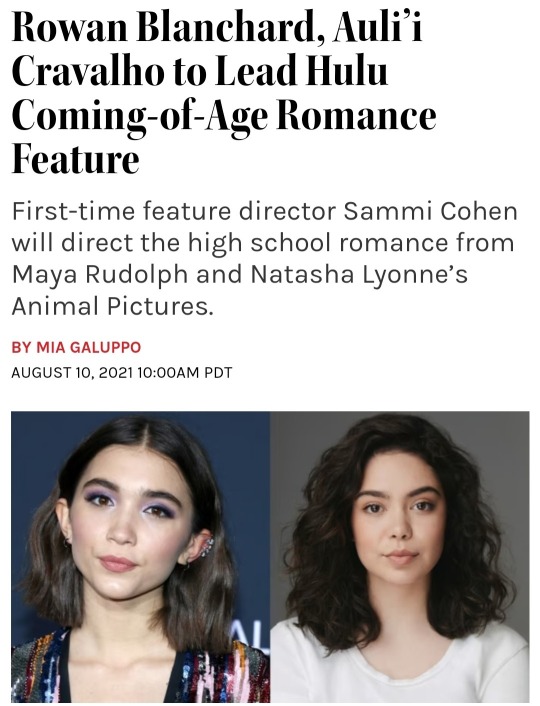
Untitled Hulu romance movie
youtube
The debut of our lesbian superhero America Chavez in Dr Strange in the Multiverse of Madness
youtube
We get our first lesbians in the Scream franchise in Scream 5

AM I OK? Premiering at Sundance 2022

The Chambermaid
The film follows Anka, a maidservant for a respectable family from Vienna, and depicts her relationship with the daughter of the house. The story is set against the backdrop of the fall of the Austro-Hungarian monarchy and the creation of Czechoslovakia during 1914–1918. Anne and Theresa, two girls born on different sides of the social ladder, become best friends, lovers and the only light in a world dominated by men. The release in cinemas is planned for 27 October 2022, on the occasion of the 104th anniversary of the founding of the first Czechoslovak Republic.

The Girls I've Been movie adaptation

Thor Love and Thunder
Thompson’s character Valkyrie "needs to find her queen, so that will be her first order of business." The actress said and according to reports the movie will indeed provide us with the first confirmed on screen female gay of the MCU.
youtube
So damn easy going
TV

The Last of Us, hbo

A league of their own, amazon

Paper Girls, Amazon

First Kill, Netflix
youtube
Harley Quinn Season 3, Hbomax
youtube
Chosen, Netflix

Killing Eve, final season
Lot's of other great shows are confirmed to come back like: Derry Girls for its final season, Batwoman, Motherland Fort Salem, Fantasy Island, For All Mankind, Yellowjackets, Wheel of Time, Station 19, Legends of Tomorrow and Leverage: Redemption.
Hopefully more of our 2021 favorites will be renewed.
Video Games
youtube
Life is Strange and Life is Strange Before the Storm remastered
youtube
Rune Factory 5 (The Japanese version of Rune Factory 5 specifically did not contain same-sex marriage, but the English, French, and German versions will include it)
youtube
Full version of Waylanders. Romance in the game has "no limitations in terms of race, class, or gender."
Dear Althea
youtube
Spirit Swap: Lofi Beats to Match-3 To
Cast spells, be queer, & crash the biggest concert of the year! Spirit Swap is an action-puzzle game set in a lush, narrative-driven world of witchy demons. Bond with a cast of witches and demons. Plan a pizza party together, crash a concert, maybe even smooch!
We're also looking forward to several visual novels including a sequel to Arcade Spirits, Arcade Spirits: The New Challengers.
#2022#new year#lgbtqia#pride#lesbian#gay#lgbt#lgbtq#wlw#bi#tv#girls who like girls#movies#video Games#first kill netflix#first kill#thor love and thunder#dr strange#america chavez#the girls i've been#scream 5#the Chambermaid#hulu#am i ok?#chosen Netflix#chosen#so damn easy going#killing eve#arcade spirits#harley quinn
1K notes
·
View notes